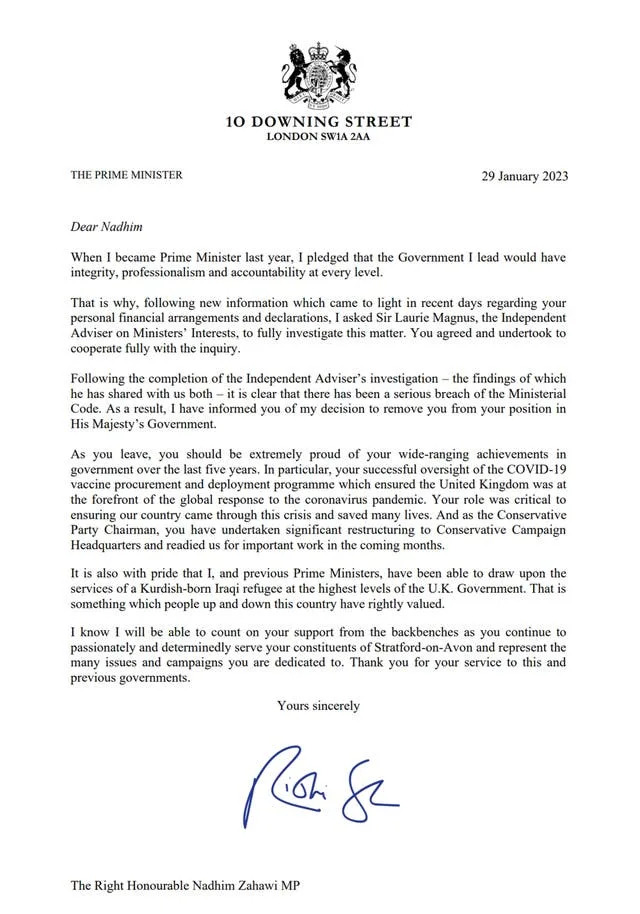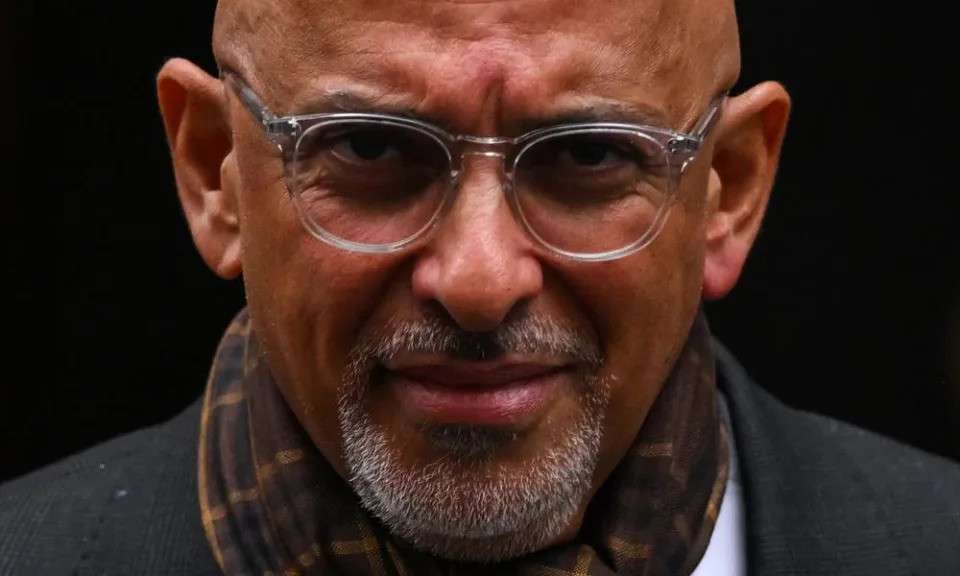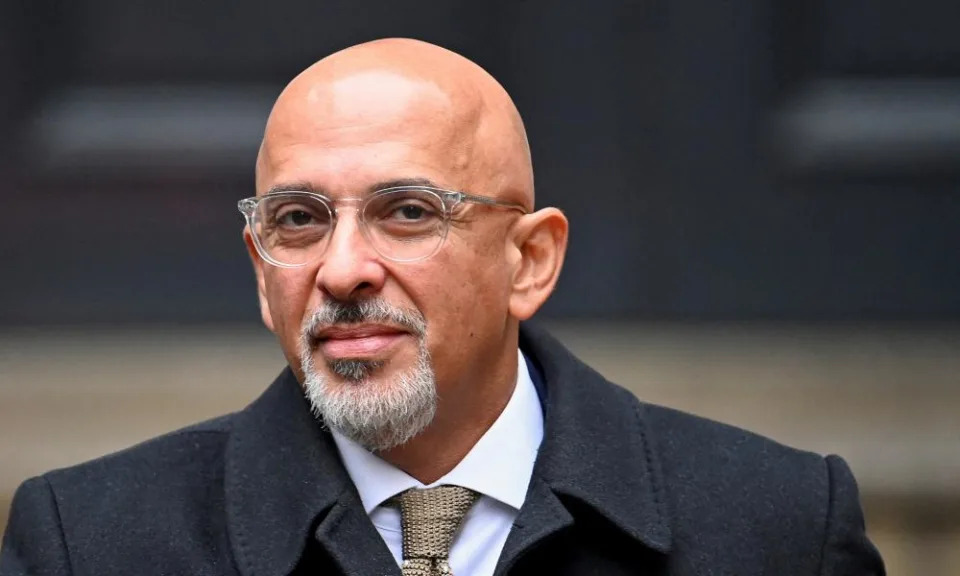UK
Sunak fights back saying he acted ‘decisively’ by sacking Zahawi over tax fiasco
Rishi Sunak has insisted he acted “pretty decisively” by sacking Nadhim Zahawi for breaching the ministerial code over his tax affairs as he vowed to restore “integrity” to politics.
The Prime Minister said he followed the “right process” as critics argued he should have acted sooner, and the ousted Tory chairman’s allies complained he was not allowed to make his case.
Beginning his fightback after the fiasco, Mr Sunak stressed “integrity is important to me” and promised to take “whatever steps are necessary to restore the integrity back into politics”.
But his spokesman said there are no plans to reform the system that allowed him to appoint Mr Zahawi while supposedly unaware of his HMRC settlement.
After a fortnight of pressure, Mr Sunak sacked the party chair on Sunday after ministerial interests adviser Sir Laurie Magnus delivered a damning verdict.
The Prime Minister said during a visit to County Durham on Monday: “On the basis of those facts I was able to make a very quick decision that it was no longer appropriate for Nadhim Zahawi to continue in Government.
“It relates to things that happened well before I was Prime Minister, so unfortunately I can’t change what happened in the past.

“What I did, as soon as I knew about the situation, was appoint someone independent, looked at it, got the advice and then acted pretty decisively.”
Mr Zahawi settled his £4.8 million tax dispute with HMRC while he was chancellor under Boris Johnson.
No 10 insists Mr Sunak was not aware of any “outstanding issues” when he appointed him party chairman after becoming Prime Minister in October.
However, the Prime Minister’s official spokesman said there are no plans to change the process requiring MPs to “declare all relevant interests” before their appointment.
“I’m not aware of any plans to change the longstanding approach which sees ministers be required to declare any relevant interests, abide by the ministerial code and face sanction if they fail to do so,” he said.
Allies of Mr Zahawi claim the MP had lost his job after being given only limited time to make his case, with the Telegraph citing claims suggesting he was only given a 30-minute meeting with the independent adviser to defend himself.
Figures inside Downing Street were disputing claims from those around Mr Zahawi, insisting there had been two conversations with Sir Laurie.
Mr Sunak’s spokesman said: “We did not set any time limit for the adviser and he was free to carry out the investigation to establish the facts, and conclude his work when he felt he had done so.
“He was able to speak to whoever he wished to in that process and we’re confident he established the facts.”
The official was forced to defend Mr Sunak’s decision to re-appoint Suella Braverman as Home Secretary just six days after she was forced out over a security breach.
“Suella Braverman resigned and acknowledged the mistake she made – she took accountability for her actions,” the spokesman said. “It was on that basis that the Prime Minister subsequently chose to reappoint her.”
Deputy Prime Minister Dominic Raab remains under investigation over alleged bullying of civil servants after an investigation was launched in November.

Mr Zahawi did not comment explicitly on the row in his letter to the Prime Minister following his sacking, instead taking aim at the media as he complained “about the conduct from some of the fourth estate in recent weeks”.
The Liberal Democrats wrote to Mr Sunak saying he should now strip Mr Zahawi of the Tory whip if he refuses to quit as the MP for Stratford-on-Avon.
Deputy leader Daisy Cooper said: “Sunak dragged his feet for weeks over this scandal. He must now act swiftly if he’s serious about restoring integrity to this sleaze-ridden Conservative Government.”
The Stratford-on-Avon Conservatives association released a statement saying “we look forward to campaigning and re-electing a Conservative MP”, without committing to putting Mr Zahawi forward to retain the seat. However, its message stated “all” local associations were going through the same process.
Labour chairwoman Anneliese Dodds said her party has also written to the PM to ask when he found out about the HMRC investigation into the former Conservative Party chairman, adding that the PM “needed a backbone” and should have sacked Mr Zahawi earlier because “the facts were clear”.
“There are serious questions for Rishi Sunak to answer. What did he know about the investigation into Nadhim Zahawi, the amount of money he had paid in unpaid tax and the penalty he had to pay?” she told the BBC Radio 4 Today programme.
“Why did Rishi Sunak say in Parliament that there weren’t questions to be answered about Mr Zahawi’s tax affairs, and why do we see our Prime Minister continuing to prop up such a rogues’ gallery of ministers?”
Sir Laurie’s four-page report, received by Mr Sunak on Sunday morning, concluded that “Mr Zahawi’s conduct as a minister has fallen below the high standards that, as Prime Minister, you rightly expect from those who serve in your Government”.
Mr Zahawi’s failure to tell officials about the tax investigation “constitute a serious failure to meet the standards set out in the ministerial code”, Sir Laurie said.
The Tory chairman had shown “insufficient regard for the general principles of the Ministerial Code and the requirements in particular, under the seven Principles of Public Life, to be honest, open and an exemplary leader through his own behaviour”.
Sir Laurie said: “In the appointments process for the governments formed in September 2022 and October 2022, Mr Zahawi failed to disclose relevant information – in this case the nature of the investigation and its outcome in a penalty – at the time of his appointment, including to Cabinet Office officials who support that process.
“Without knowledge of that information, the Cabinet Office was not in a position to inform the appointing Prime Minister.”
Stephen Massey, the party’s chief executive, has stepped in as interim chair until Mr Sunak chooses a successor.
Former Tory leader Lord Hague, Mr Sunak’s predecessor as MP for Richmond, dismissed speculation linking him to the vacancy.
“Since I’ve seen reports of people placing bets on me being the new party chairman, please be aware that I will absolutely not be returning to politics in any shape or form, including that one,” he said.
How Nadhim Zahawi was fired from government
Nimo Omer
THE GUARDIAN

Photograph: Daniel Leal/AFP/Getty Images
After 10 embarrassing days for the government, Rishi Sunak finally fired the Tory party chair, Nadhim Zahawi, after a damning investigation by the prime minister’s ethics adviser found Zahawi had committed multiple breaches of the ministerial code by first failing to declare that he was under investigation by HMRC and then that he had paid a penalty. Sunak’s detractors have accused the prime minister of weakness for not acting sooner, but he has insisted that he had to go through the proper procedures before making any decision.
While Zahawi’s dismissal marks the end of this particular episode of Tory party mess, the news comes as Sunak battles to maintain control of his party, with his deputy also under investigation after multiple allegations of bullying staff. The firing has also further damaged the reputation of a government already marred by accusations of sleaze. Today’s newsletter looks at what has been said so far and what is next for the embattled prime minister.
In depth: A ‘serious breach’
Rishi Sunak’s ethics adviser, Sir Laurie Magnus, was not investigating the details of Nahim Zahawi’s tax affairs – despite denials and legal threats to the contrary, it turned out HMRC had already done a thorough job of that. Rather, Magnus was tasked with examining how Zahawi had dealt with the situation, prior to and after the accusations were made public, and whether his actions lined up with the ministerial code.
The findings were clear: Zahawi was guilty, on multiple counts, of a “serious breach”. First was his failure to declare that he was under investigation by HMRC when appointed chancellor in July 2022. He breached the code again by failing to declare, when he was appointed to Liz Truss’s and then Sunak’s governments, that he had paid a penalty for tax avoidance.
In his report, Magnus highlighted that HMRC began investigating Zahawi in April 2021, meeting with him and his advisers a few months later, while he was a business minister. Zahawi did not disclose this information or alert the relevant government officials then, or when he was promoted to education secretary by Boris Johnson in September, despite the fact that ministers are supposed to complete a declaration of interests form that includes “specific prompts to tax affairs and HMRC investigations and disputes”. Nor did he mention the investigation when he was promoted to chancellor almost a year later. Zahawi also failed to raise the issue when he paid a penalty to HMRC.
In the following months, Zahawi was made chancellor of the Duchy of Lancaster by Liz Truss and then given the role of party chair by Rishi Sunak. Despite media reports of Zahawi’s tax affairs, he still did not make a declaration. Instead he went on the attack, threatening those involved with legal action and describing reports of the investigation as “inaccurate, unfair and clearly smears”. (Heather Stewart and Josh Halliday have written a comprehensive timeline of events.)
In conclusion, Magnus writes: “I cannot mitigate my overall judgment that Mr Zahawi’s conduct as a Minister has fallen below the high standards that, as Prime Minister, you rightly expect from those who serve in your government.”
***
Sorry seems to be the hardest word
Despite the evidence-based clarity and candour of Magnus’s report, there has been a marked absence of contrition in Zahawi’s public response. He has opted for barely concealed defiance, boasting of his record in government, while criticising the media for its coverage of his tax affairs and omitting his ministerial breaches. The word sorry is acutely missing. With no apology in sight, Zahawi chose to highlight his achievements while in the cabinet, writing that he was particularly proud of the vaccine rollout that he oversaw, and his role in ensuring that “everything went smoothly” during the mourning period after the Queen died.
Zahawi said that he would continue supporting the PM from the backbenches for years to come. So, I guess there are no hard feelings.
***
A speedy response?
After the publication of the report, Sunak swiftly announced that Zahawi would be removed from government. It was so swift that Michael Gove had to change tack between appearances on Sunday morning news shows. The prime minister wrote that the findings of the investigation show that Zahawi’s actions had violated the pledge that his government “would have integrity, professionalism and accountability at every level”.
Nonetheless, Sunak has been facing more and more questions about his judgment for reappointing Zahawi in the first place – which was after the media had first reported on the claims – and for keeping him in office when it became apparent those reports were correct. While his supporters say that waiting shows he is level-headed and values detail in the face of chaos, many others would argue that Zahawi’s sacking was an inevitability and that Sunak has revealed he is unable to make tough political decisions. There are also questions remaining over what he knew about the minister’s tax affairs and when, with suggestions that Sunak was told there could be a reputational risk to the government when he appointed Zahawi in October.
And it’s not just Zahawi: in his first three months, Sunak’s government has been mired in scandal, with Dominic Raab still awaiting his fate with investigations ongoing into accusations of bullying. While Sunak has been faring better than the Tory party as a whole in the eyes of the public, the poor reputation of his colleagues cannot help but make his government look like a continuation of the chaos that has characterised the party for the past four years.
Pippa Crerar Political editor
Sun, 29 January 2023

Photograph: Toby Melville/Reuters
Rishi Sunak has sacked the Conservative party chair, Nadhim Zahawi, for serious breaches of the ministerial code over his tax affairs, after weeks of damaging headlines undermined the prime minister’s attempts to restore government integrity.
An investigation by Sunak’s new ethics adviser, Sir Laurie Magnus, concluded that Zahawi had broken the rules by repeatedly failing to declare an HMRC investigation into his tax affairs, which concluded with a £5m settlement including a penalty.
Zahawi failed to apologise for his actions, instead turning his fire on the media, which he said had gone beyond legitimate scrutiny of his tax affairs. The ethics adviser, however, criticised him for “untrue” public statements over the HMRC investigation.
In a letter to Zahawi after an early phone call on Sunday, Sunak said his ethics adviser had concluded there was a “serious breach” of the ministerial code. “As a result, I have informed you of my decision to remove you from your position,” he wrote.
Related: Nadhim Zahawi: the extraordinary rise and fall of ‘the boy from Baghdad’
Zahawi’s departure – as the second cabinet minister to go in Sunak’s first three months in office – comes after a difficult few weeks for the prime minister, who had pledged “integrity, professionalism and accountability at every level” of his government on entering No 10.
His hopes of moving on from the probity row are likely to be short-lived, with an internal inquiry into bullying allegations against his deputy prime minister, Dominic Raab, due to report within weeks.
Sunak’s judgment in reappointing Zahawi has come under question from some Conservative MPs, while others felt that the prime minister, who acted within hours of receiving Magnus’s report on Sunday morning, should have sacked him earlier.
The prime minister, who will be trying to refocus attention on the NHS during a visit to north-east England on Monday, also faces scrutiny over what he knew about the minister’s tax affairs and when, amid suggestions he was told there could be a reputational risk to the government when he appointed him in October.
Downing Street insiders said Sunak would not be rushing to replace Zahawi as Tory party chair, and he was expected to replace him with a close ally when he does, although Tory MPs have suggested that Penny Mordaunt, the Commons leader, Andrew Mitchell, a Foreign Office minister, and Grant Shapps, the transport secretary, could be candidates.
George Osborne, the former chancellor, suggested Sunak’s premiership risked being brought down by scandals swirling around the Tories, with the high-stakes Commons inquiry into whether Boris Johnson misled MPs over Partygate due to begin hearings within weeks.
“At the moment he is being pulled down by a series of scandals which do not directly involve him, are kind of hangovers, if you like, of the Johnson era. But he needs to do something pretty quickly,” he told Channel 4’s Andrew Neil show.
“I think that he’s going to try and define himself now as ‘the sleaze buster’, but it’s extremely hard … It’s still ‘we’ll see’ with Rishi Sunak, but he knows that as each week passes, as each new scandal unfolds, the window for action gets smaller and smaller.”
Magnus found that Zahawi breached the ministerial code on seven separate occasions by repeatedly failing to declare his tax affairs and denying media reports that he was under investigation by HMRC, then failing to correct the record. His investigation took six days to complete.
The HMRC investigation into Zahawi began in April 2021, and there was a face-to-face meeting with the minister in June 2021. In his first breach of the code, Zahawi did not declare the matter, later telling the ethics adviser he had failed to realise it was a formal investigation. But Magnus said he should realised it was an investigation and treated it as a “serious matter”.
The next two breaches came on 15 September 2021 and 5 July 2022 when Zahawi was appointed first as education secretary and then as chancellor, by Boris Johnson, but failed to declare the HMRC investigation to senior officials until after 22 July 2022.
Magnus suggested the latter breach was particularly egregious as Zahawi had been put in charge of the Treasury, which has responsibility for the UK tax system. The settlement with HMRC was reached during his time there.
After media reports last July of an HMRC investigation, Zahawi issued a public statement saying the claims were “inaccurate, unfair and clearly smears”. He claimed he still did not believe he was under formal investigation, and did not update the record until 21 January this year. Magnus said the delay in correcting an “untrue public statement” was a breach of the ministerial code.
Zahawi reached an in-principle agreement with HMRC in August 2022, while he was chancellor, and made a final settlement, including a penalty for tax avoidance, for about £5m in September 2022. He did not disclose this until mid-January.
His sixth and seventh breaches of the code came when he failed to officially declare the settlement – including to officials – when he was given cabinet positions by Liz Truss in September 2022 and when Sunak made him Tory chair and minister without portfolio a month later. Zahawi finally updated his declaration of interest to include the outcome of the HMRC investigation on 16 January 2023.
In his letter to Sunak, the ethics adviser said: “Taken together, I consider that these omissions constitute a serious failure to meet the standards set out in the ministerial code.”
In his own letter to the prime minister, Zahawi did not apologise or explicitly mention the findings of the ethics inquiry into his tax affairs, and suggested that he planned to stay on as an MP “in the coming years”, despite calls to step down.
However, he raised concerns about some media conduct in recent weeks, which he said went beyond legitimate scrutiny of his tax affairs. He singled out a piece in the Independent, which first revealed the HMRC investigation, headlined “The noose tightens”, which was about calls from fellow Tories for him to resign.
Related: How we got here: events leading up to Nadhim Zahawi’s sacking for breaching ministerial code
Zahawi issued a statement the day after his HMRC penalty came to light, saying the tax office had concluded he had made a “careless but not deliberate” error.
But his statement raised as many questions as it did answers, and called into doubt earlier remarks including the assurance in July 2022 that his taxes were “fully paid and up to date”, and letters from lawyers threatening legal action against reporters who said this was potentially not the case.
The shadow cabinet minister Bridget Phillipson said: “Nadhim Zahawi failed to pay the taxes he owed in this country and tried to silence those who spoke out about it. Despite the writing on the wall, the prime minister showed himself to be too weak to act. Rishi Sunak should have sacked Nadhim Zahawi a long time ago, but in his weakness he promoted him.”
Michael Gove defended Sunak’s decision to refer the matter to an ethics inquiry before sacking Zahawi. “As a general rule I think it is important when allegations are raised that they are investigated promptly, but also we shouldn’t rush to judgment before there’s been that investigation,” he told the BBC’s Sunday with Laura Kuenssberg programme.
No comments:
Post a Comment